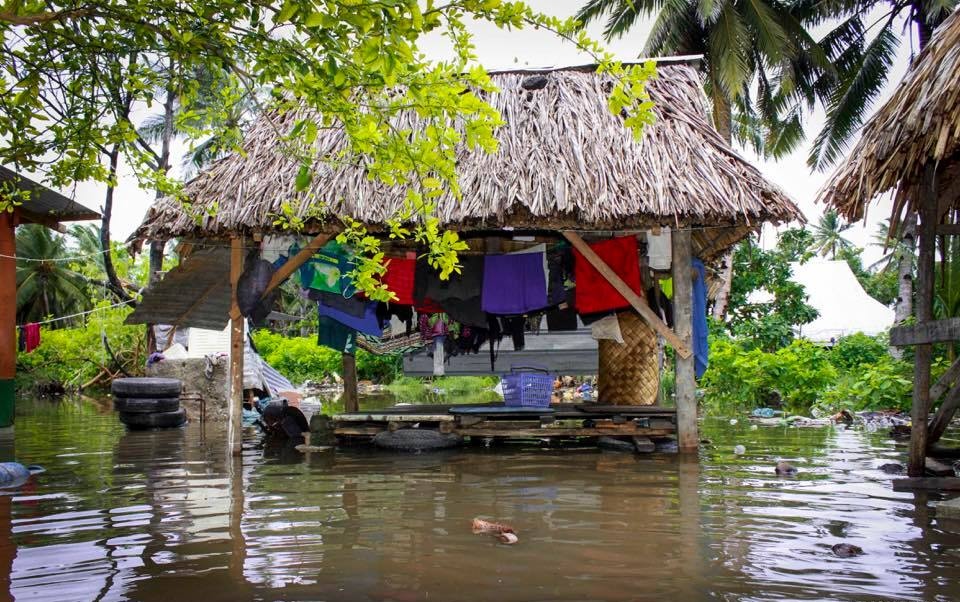New Zealand must be better prepared for an increase in climate-related migration from the Pacific, new research says, with rising waters and changing weather already forcing some in the region to move.
Though large-scale relocation of entire communities or islands is unlikely according to the research, such dramatic moves cannot be ruled out in the longer term - and families and communities are likely to continue making their way to Aotearoa in the coming years.
The research was commissioned by the Ministry of Foreign Affairs and Trade to better understand the impact of climate change on migration within and across the Pacific, and carried out by the University of Auckland, the University of Waikato and Mana Pacific Consultants.
※Climate change-related (im)mobility is already here. It is an issue which requires the attention of policy now, not in the future,§ the summary report says.
※There is no shortage of people looking for opportunities to move to Aotearoa New Zealand and Australia in the Pacific region, and the numbers seeking these opportunities will only increase over the coming decades.
※Inevitably the impacts of climate change in the region are going to increase pressure on the two metropolitan countries on the Pacific’s southern rim to free up opportunities for short-term and long-term circulation of Pacific peoples as well as possibilities for residence for families in the overseas part of Pacific transnational societies.§
At least 1.2 million people connected to the 20 various Pacific Island countries and territories were living in New Zealand, Australia or the United States in 2021 - a figure that could increase to 3.5 million by 2050, 78 percent of the projected population within the Pacific countries and territories themselves.
However, many communities had already shown ※a steadfast commitment to their ancestral territories, preferring to stay§ despite the rise of climate-related hazards - a stance that was unlikely to change in future.?
※Given the strong attachment to place, including the nation as a &place’ at a larger scale, the research does not support a finding that there will be a desire to relocate internationally at large scale. However, given residual uncertainties in the climate system, and looking out over longer time frames towards beyond 2050, the need may arise in some national settings.§
If there was a &mass arrival’ of Pacific peoples to New Zealand, it would likely take place at an individual or household level over the next several decades, a pattern that would still require policy changes.
Talanoa (a Pacific form of dialogue) with Maori and others in New Zealand could help to better understand the risks and opportunities for higher climate mobility in the future, with ※an increasingly urgent need§ for a public awareness campaign to improve preparation and planning.
If there was a need for large-scale migration in future, mana whenua would need to be consulted on land-related decision making, and agreed frameworks could be set up for such scenarios.
With a quarter of New Zealand families experiencing severe household deprivation identifying as Pasifika, and the existing population likely to act as ※first responders§ to future climate-related migration, improvements to the Pacific housing sector were critical.
&In those discussions about people having to move because of climate, we’ve got to be able to allow people to do that with dignity and in a respectful way that helps to uphold that cultural identity&
Teanau Tuiono, Green Party spokesman
Those who wanted to stay in their Pacific nations would need support dealing with food and water insecurity, as well as increased stress and mental health problems associated with changing climate conditions.
Green Party foreign affairs and Pacific peoples spokesman Teanau Tuiono told Newsroom the research’s findings were a reminder that New Zealand needed to have a clearer focus on the Pacific, and be better prepared for how climate change was affecting mobility.
Tuiono said the Government should develop safe migration pathways for Pacific peoples to come to Aotearoa, including the legal recognition of those displaced by climate change, while also helping to safeguard their cultural traditions.
※This is true for me as someone who’s first-generation Pasifika born here in Aotearoa, and for many people like myself: our island homelands play a big part in terms of our cultural identity, so in those discussions about people having to move because of climate, we’ve got to be able to allow people to do that with dignity and in a respectful way that helps to uphold that cultural identity.§
Pacific Island nations had contributed minimally to global greenhouse gas emissions yet were among the most severely affected by climate change, meaning countries such as New Zealand had a humanitarian responsibility to offer support to the region, Tuiono said.
A ministry spokeswoman told Newsroom the goal of the research was to produce ※actionable knowledge§ for officials in New Zealand and the Pacific Islands on what was a complex and challenging issue.
New Zealand’s climate mobility support in the Pacific to date included international climate finance for adaptation measures, over $6 million in funding for a Fiji-based community relocation trust fund, and further financial support for the UN-backed Pacific climate change migration and human security programme.
Governments in New Zealand and the Pacific would now consider the findings from the research, the spokeswoman said.


